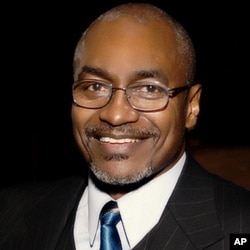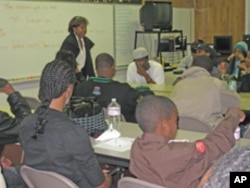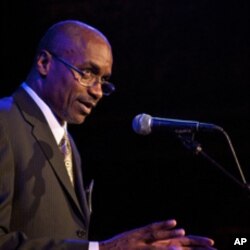Joe Marshall didn't start out as a mentor for troubled youth.
After earning his doctorate in psychology, he spent 25 years as a teacher and administrator in San Francisco. Marshall taught math in middle school and expected to see his best students make it to college.
"But I got a lot of horror stories and a lot of my former students ended up dead or in prison for selling drugs, being involved in gangs, girls ended up pregnant," he recalls. "So it didn't quite work out the way I had envisioned it. And I was really, really hurt. I got into this business to have young people succeed. I knew their potential, and they were not only not living up to their potential. They were not living."
The statistics do suggest young African-American men face a grim future. Many grow up in neighborhoods that are plagued by gangs, drugs, and violence. More than half of them don't finish high school. And by the time those drop-outs are in their mid-30s, six out of 10 have spent time in jail.
Those facts, and his own experience, prompted Marshall to leave the classroom to set up an internationally-recognized program that gives at risk young people a safe haven and the chance of a better future.
A 'prescription' for staying alive and free
Marshall co-founded the Omega Boys Club 23 years ago with the goal of keeping kids alive and free.
The club is located in a violence-free area of San Francisco and serves more than 400 young people every year. Twice a week, it offers after-school classes in math, literacy, family and life-skills and college preparation.
In many ways, the club serves as a substitute family by providing the teens with structure, support, and protection.
Marshall sees gangs and violence as a disease that needs to be addressed as a public health problem. He compares them to a virus that's infected a computer.
"Can't do anything but destroy. That's what these young people get. They get a street-mentality, a mind-set that sends them straight to six feet under or the penitentiary," he says. "The big part is dealing with the emotional residue of anger, fear, and pain that they develop because they got invested in this in the first place. Then we tell them to follow some new rules for living that will decrease their chances of ending up dead or in prison and increase their chances dramatically of staying alive and free. We follow this prescription religiously, just as your doctor would give you a prescription. We know it works. It's up to them to take it."
'Stop the violence' and 'Don't do drugs' are the prescription he delivers to his young students every week at the Omega Boys Club.
Play music, save lives
Radio is the Omega Boys Club's most effective way of getting its anti-violence message out to thousands of young people. In 1991, Marshall started "Street Soldiers," a weekly radio call-in show on KMEL, San Francisco's number one hip-hop station.
He talks of the day one of the club's graduates, Marlena, called in.
"She's at Southern University right now, going into her third year. She talked about what she had learned the hard way and how we helped her learn that by coming to Omega, by listening to "Street Soldiers," and she said she had learned how to love herself. I thought that was so powerful. Because it's a story you've heard many times - about being abused, molested, all that kind of stuff. And the folks who can help you are right on the other end of this phone line."
Marshall's Omega Boys Club was instrumental in helping Marlena and many other students attend college.
It provides counseling and financial assistance to help them stay in school. Since the Omega Boys Club started, almost all the young people who joined remain alive and out of prison. Over 90 percent of its members who were accepted into college have now graduated.
A national model
The Omega Boys Club has become a model program that has been replicated in twelve other U.S. cities.
Marshall is in-demand as an anti-violence expert and has been invited to address community groups in Nigeria, Canada, South Africa, and Thailand to spread his alive and free prescription.
Although he turned 63 this year, Joe Marshall has no thoughts of retiring any time soon.
"I want to build an institution," he explains. "I'm not going to be here forever, so my big thing is to make sure this goes on. So we put a lot of work into institutionalizing what we do as the headquarters of the alive-and-free movement. All this has worked to further my goal of keeping young people alive and free and helping communities in the Bay Area, around the country and around the world. So I'm not stopping. That's why retiring is hard for me to talk about."
Marshall says he's so busy these days that he can't remember the last time he took a vacation. But there are still many more young people to save and he hopes they keep coming to him.






